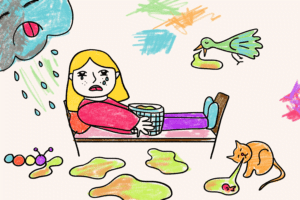Contents
What Is Emetophobia?
 Emetophobia is the intense fear of vomiting. It can be linked to a previous negative experience with vomit. These are such as getting sick after eating bad food or seeing someone else get sick (e.g., at work). But this doesn’t always mean that there was any one particular incident in your past which you now associate with nausea and vomiting.
Emetophobia is the intense fear of vomiting. It can be linked to a previous negative experience with vomit. These are such as getting sick after eating bad food or seeing someone else get sick (e.g., at work). But this doesn’t always mean that there was any one particular incident in your past which you now associate with nausea and vomiting.
How Common Is Emetophobia?
Are you among the 15% of people who suffer from emetophobia, or are you prepared to join them soon enough? The number is actually closer to 20%. While it’s much more common for women (about one out of four) than men (one out of ten), there are plenty of guys with this fear too. As many as 80% have had their first experience with vomiting at a young age; 13 – 25 years old seems to be when most sufferers develop this phobia, though some wait until they’re well into adulthood before becoming afraid.
An estimated half-million alone will make an appointment with their healthcare provider about nausea or vomiting within the next year. This is only a small percentage of those suffering from emetophobia. Now you can see how many people are hiding this phobia. These all are approximately struggling on their own without help.
Symptoms of Emetophobia
 These are some of the symptoms of emetophobia you might be suffering from if this phobia is ruling your life. Have any of these occurred within the last six months? If so, there’s a good chance that you have developed an intense fear of vomiting:
These are some of the symptoms of emetophobia you might be suffering from if this phobia is ruling your life. Have any of these occurred within the last six months? If so, there’s a good chance that you have developed an intense fear of vomiting:
- Fear or anxiety about seeing someone else vomit (e.g., at school)
- Feeling nauseous frequently with no cause
- Avoiding medical appointments for nausea and/or vomiting because it makes you too anxious to go
- Frequently thinking about vomiting or how to avoid it happening around you
- Feeling nauseous or sick frequently could be due to another condition, so if you’ve checked with your doctor and everything else is fine it might not mean anything more than emetophobia.
Causes of Emetophobia
These are some of the causes of emetophobia:
- Negative experience with vomiting (e.g., getting sick after eating bad food or seeing someone else get sick)
- Genetics and family history of emetophobia, OCD, other anxiety disorders, depression.
Diagnosis of Emetophobia

There are two options of diagnosis: self-diagnosis and formal diagnosis.
Self Diagnosis
You can try to check yourself with these questions from the list below. If you’re not quite sure it will be better for your own well-being as well as that of those around you to have a professional diagnose this phobia. If your fear is interfering with work or school, family life, social activities/relationships, etc., then there is a good chance that it has gotten out of control enough to seek help. Have any of these been present in the last six months?
You can know if you have emetophobia or not by answering these questions. If you answer yes to more than one of them, your fear could be getting in the way of living a healthy life.
- Do you have an intense panic attack when you realize that there’s vomit somewhere?
- Are other people able to eat things that make you nauseous or even make you feel sick because they know it won’t affect them?
- Does seeing someone else get ill cause feelings of anxiety and/or disgust about vomiting for hours afterward?
Formal Diagnosis
A mental healthcare provider or another medical professional would make an accurate diagnosis. This is after asking several questions about how long emetophobia has been impacting your life. They will also ask what symptoms are present.
Emetophobia Treatment

There are several treatment options for emetophobia. The first step is to make an appointment with a healthcare provider if you haven’t already done so or had concerns that everything might not be fine physically, mentally, and emotionally. These professionals understand the fear of vomiting better than anyone else can because they work on it every day in their practice. If you feel comfortable talking about your fears openly without judgment, then this could help immensely toward overcoming them as well as a beginning proper treatment:
Cognitive Behavioral Therapy (CBT)
Cognitive Behavioral Therapy helps sufferers learn how to challenge their negative thoughts and teaches coping skills such as breathing exercises when those thoughts arise; those suffering from both anxiety disorders and phobias tend to benefit the most from this method.
Hypnotherapy
This can help relax your body and mind so that you are more open to change. This is often helpful for those who suffer from anxiety disorders and phobias.
Medication (e.g., Antianxiety Medications)
These can be helpful in conjunction with therapy or when symptoms make it difficult for sufferers to deal with their fears on their own without outside assistance.
Support Groups
These are a great way for you to connect with others who know exactly what it feels like to have this phobia so that you can help each other get through affirming times and learn coping skills.
Emetophobia Prevention
There is no surefire cure for emetophobia. This is because everyone’s fears are different in their nature as well as the ways they manifest themselves. However, there are several things that you can do on your own or together with therapists/doctors:
Avoid Triggers
Avoiding triggers (e.g., certain foods) when possible; being prepared if one cannot be avoided by having something else readily available at all times just in case of an emergency situation where vomiting could occur during the meal.
Stay Informed
Staying informed on new treatments and medications as they are made available to the public. sharing information on these with therapists/doctors so that you can be proactive about staying ahead of your fears instead of facing them head-on all at once if it is too much for your system after working hard to get this far in treatment.
Practise Relaxation Techniques
Practicing relaxation techniques (e.g., deep breathing) and visualizations to help calm your mind and body when you start feeling anxious; these can be practiced anywhere at any time, especially if the fight-or-flight response has been activated in a nonthreatening situation such as grocery shopping or even seeing vomit somewhere where it isn’t expected like on television or social media.
Engage In Self-Care
Engaging in self-care practices (e.g., yoga, meditation) that allow you to feel more grounded and connected with yourself and your emotions; will help build a stronger sense of self-esteem as well as emotional resilience which can be beneficial during difficult times such as when the need for emetophobia treatment arises.
Visualize Pleasant Scene
When you feel an attack coming on, try to visualize a pleasant scene. It can be anything from lying on the beach to sitting in a garden surrounded by beautiful flowers.
Talk about Your Fear
Expressing your fears and concerns out loud can often make them seem less daunting. Talking with someone who understands can also be helpful in finding ways to cope with emetophobia.
Challenge Negative Thoughts
Whenever you have negative thoughts or images related to vomiting, challenge them head-on. Ask yourself whether there is any evidence that what you’re thinking is actually true. Chances are, the answer will be no.
Conclusion
There is a societal stigma about mental illness. The more we talk about it, the less of a taboo it becomes. Mental health will always be an issue in society. This is because every person has their own struggles and demons that they have to deal with. It’s important for people who are struggling to know that there is help out there. They should not feel alone or ashamed by their diagnosis. They should also know that if someone close to them suffers from emetophobia, they can still empathize without feeling too anxious themselves. But this requires patience and understanding on both sides of the equation. This also needs communication between those involved.
For more information, please contact MantraCare. Anxiety is a common mental health condition characterized by persistent feelings of worry, fear, and apprehension. If you have any queries regarding Online Anxiety Counseling experienced therapists at MantraCare can help: Book a trial Anxiety therapy session


